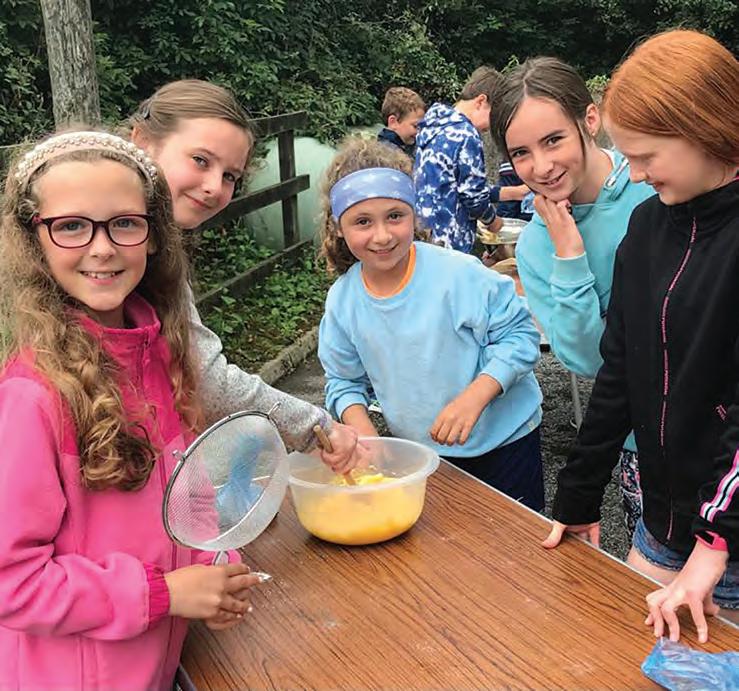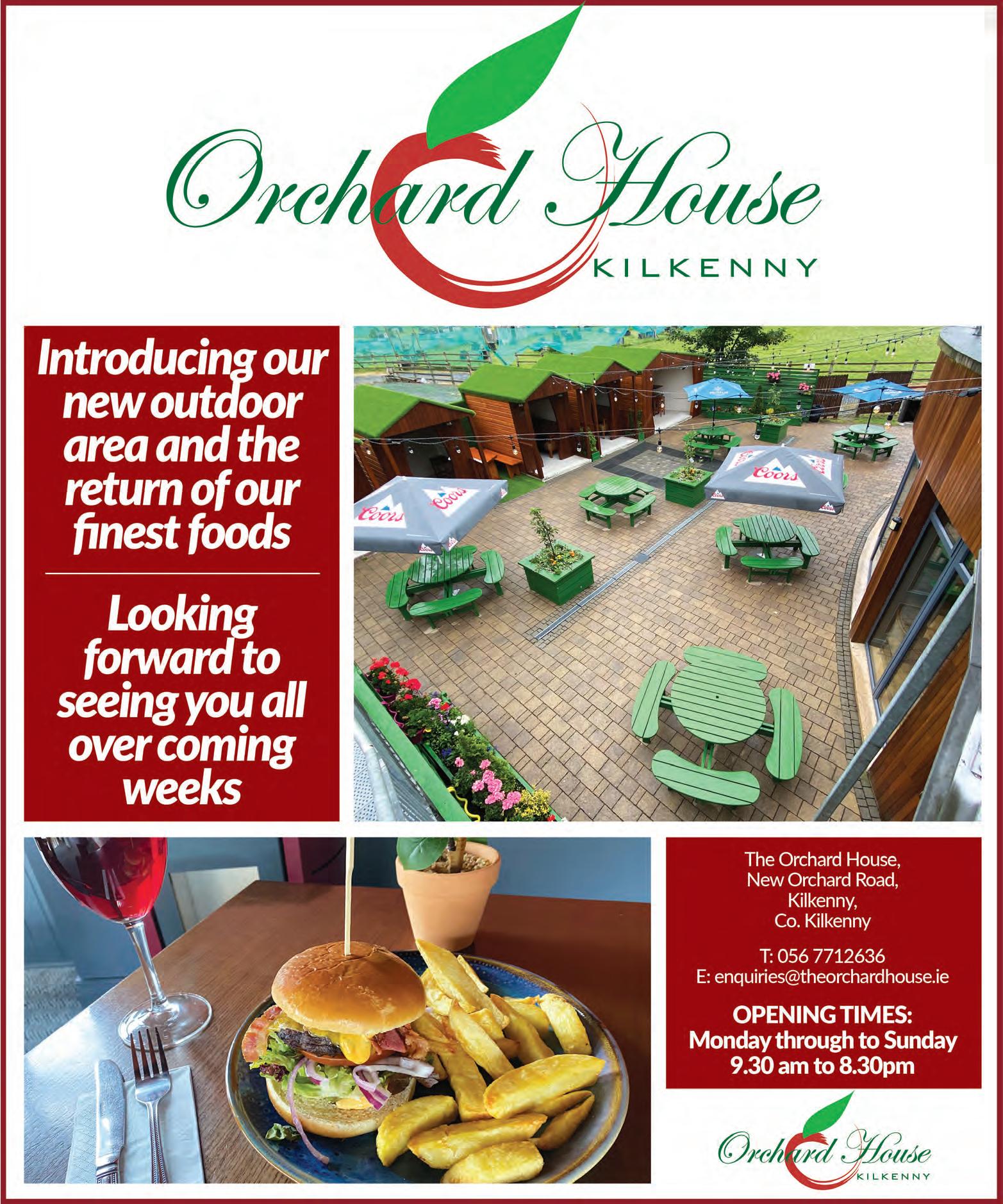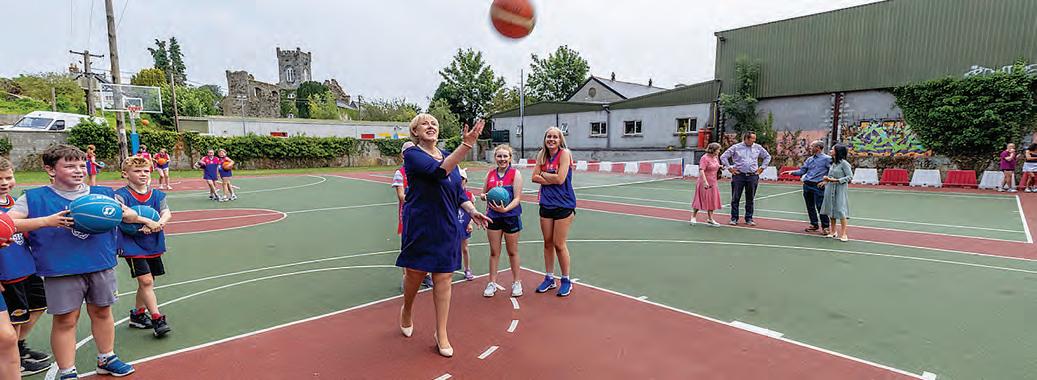
30 minute read
Paul Hopkins
The Fact OfThe Matter
PAUL HOPKINS
Advertisement
Doris Roberts knew about the need for hugs
DORIS Roberts gave the best hugs I have ever known. Tight and fierce, and sincerely felt. Doris and her family were refugees evacuated to their native north Wales when the Germans bombed Liverpool. The only hotel in Prestatyn was unable to offer wheelchair access to Doris and her nurse.
My great aunt Kathleen and her husband had left Dublin in 1938. Jack Greaney died just before the outbreak of the war leaving my aunt a widow, without children, living in a big house by the Welsh coast where my family and I would later spend the long, hot summers of my youth.
After Doris’s family were returned to Liverpool my great aunt, serendipitously, was to take Doris in and look after her, her every need, for many, many years. It was a love at its finest.
Doris, still a young women when she came into my childhood, was physically and mentally challenged. She suffered from what in those days was termed spasticity. Doris had congenital damage to her brain, spinal cord and motor nerves. Her legs and arms were twisted limbs, her vocabulary little or none — about five or six words — but she was the smartest human I would know as a child — she could spot a pin on a patterned carpet a mile away. And she was most loveable, with a passion for peppermint creams and watching the pioneering days of horse racing on TV. And she was that great hugger of me and my siblings, the ‘babas’, squeezing the living daylights out of us, her feelings knowing no bounds.
For many, what we’ve missed most during the pandemic is being able to hug loved ones. Now, with the vaccines and the restrictions easing, we are learning to hug again. And not only do hugs feel good — they also have many health benefits.
The reason hugs feel so good has to do with our sense of touch. It’s an extremely important sense that allows us, not only to physically explore the world around us, but also to communicate with others by creating and maintaining social bonds.
Touch is the first sense felt in the womb (around 14 weeks). Pediatrics tells us that from the moment we’re born, the gentle, frequent caress of a parent promotes the growth of brain cell connections.
When someone hugs us it induces a cascade of ‘neurochemical signals’, including the hormone oxytocin which plays an important role in social bonding, slows down heart rate and reduces stress and anxiety. The release of endorphins in the brain supports the immediate feelings of pleasure and wellbeing derived from a good hug.
Hugging benefits our health in other ways. It improves sleep — that parental goodnight hug. From the benefits of sleeping with infants to cuddling your partner, gentle touch is known to regulate our sleep, as it lowers levels of the hormone cortisol, a key regulator of our sleep-wake cycle.
In the outside world, social touch — handshakes, bear hugs in sport — helps maintain relationships by releasing those endorphins, making us see hugs and touch as ‘rewarding’.
As my psychologist friend from Magherafelt says: “Touch provides the ‘glue’ that holds us together, underpinning our physical and emotional wellbeing.”
And when touch is desired, the benefits are shared by both people in the exchange. In fact, even stroking your pet can have its benefits — with oxytocin levels increasing in both pet (see that tail!) and owner.
Hugging, I have recently learnt, could help fight off infections by regulating the hormones oxytocin and cortisol. Whereas high levels of stress can suppress our ability to fight infections, close, supportive relationships suggest the opposite, even cuddling in bed protecting us from the common cold!
While it’s important we continue to keep ourselves safe, it’s equally as important that we don’t give up on hugs for ever. Social isolation and loneliness can neither be healthy nor, indeed, natural. Human touch is instinctive. We should celebrate its return.
POSTSCRIPT: As a grown and young married man, I went to see Doris Roberts one more time. Well in her 70s, she had outlived her family and my great aunt and was in a nursing home. She was alone by the window when I walked into the conservatory.
“Doris,” I called, and she looked up, her toothless face breaking to a broad smile.
“Baba,” she cried as I walked towards her.
Despite the intervening years, her now old, still twisted arm went right round my grown waist and she hugged the living daylights out of me, one last time.

Dealing with difficult people
ANDREW MCDONALD HYPNOTHERAPIST
WE all have to deal with difficult people. However, keep in mind one thing; you have to cope with them for a short time, they have to be with themselves all day long.
All of us have people in our lives who bring us down and stress us out. Sometimes the pain can be short-lived, an acquaintance who moves into and out of our lives just as quickly or perhaps a relative we only have to see at Christmas. Other times it can be longer, for example a bad boss. If we’re unfortunate, it might be someone who is a big part of our lives, for example, a close family member.
Everyone knows at least one person who the mere thought of affects their mood. A really important thing to keep in mind though is that whilst they are responsible for their behaviour, we bear the responsibility for how we react to them. If we can cut ties with them, this can be the best option. If we can’t distance ourselves from their negative influence, there are other things we can do.
A particularly powerful method of dealing with difficult people, or at least the effect they have on our wellbeing, is to try to understand them. Every living creature, including human beings, wants to be happy. Chances are a difficult person is struggling with that. This doesn’t excuse their behaviour but it does put it into a different perspective. Perhaps their words and actions are caused by their own pain. In no way does this give them a free pass on causing distress to other people but it can help reframe how you see them and how they act.
This thinking can be used as the basis for mindfulness practice. Tonglen meditation involves offering compassion to others. We start by thinking about someone we love and who makes us feel good and whilst meditating we send them good wishes of happiness. Then we bring to mind somebody we’re neutral about and go through the same pattern. Thirdly, we focus on somebody we dislike and who causes us pain and offer them positive thoughts with the hope of them being happy. We finish by doing the same towards ourselves. This can often create enough compassion to change how we cope with difficult people.
A great way of reshaping how we perceive difficult people is to see them as a challenge. If we determine to show kindness and understanding to everyone, it can help strengthen this determination if we resolve to be compassionate even with people who cause us frustration.
Of course, none of this means we should ever put up with abuse. If someone is abusive, rather than simply difficult, you absolutely should break ties with them and look for help in doing this if necessary. However, for people who don’t abuse you but do cause you difficulty, there are ways of dealing with them whilst maintaining your own well-being.

Security risks surge with remote working
TWO-FIFTHS (38%) of Irish adults admit that they do not currently have any home security despite one in three now working from home, according to new research by Allianz Insurance.
The national survey of 1,000 people, conducted by Coyne Research, found that 13% of those working from home have not taken any steps to protect their work devices when not in use, leaving them open to major risk. The new research comes as Allianz hopes to shed light on confusion for renters and homeowners. According to the research, 14% of all respondents admit that they do not have home or renter’s insurance and of those who do have insurance, there is uncertainty if their insurance covers their home working equipment.
There is clear confusion when it comes to insuring remote working devices, as over a quarter of those polled believe it’s their employer’s responsibility to insure devices, while nearly one-fifth believe it’s a shared responsibility between themselves and their employer. With a fifth of all remote workers having no dedicated workspace in the home, security at home appears to have fallen flat as a result of the pandemic.
While nearly half of all remote workers (47%) lock their devices with a password before clocking off, younger generations are less inclined to be security conscious with just 36% of Gen Z’s admitting to doing this every day. When it comes to their home security, over half of all Irish adults claim that they have a standard alarm or home monitored alarm system in their households. Millennials (40%) and Gen X’s (44%) are the least vigilant generations as they admit they have no form of home security. While the majority (59%) of all adults working from home have not taken any additional steps to increase home protection since the lockdown, twofifths of the group have looked into new measures to keep their homes safe and secure.
Security cameras (52%), keeping valuables out of sight (44%) and new home alarm systems (34%) were polled as the leading additional protection measures, with just 2% of the remote workers looking to new locks for extra security.
Funding is allocated to remote work hubs
FUNDING for remote working hubs in Kilkenny has been announced by Minister for Rural and Community Development Heather Humphreys TD, under the Connected Hubs Scheme – a key deliverable of ‘Our Rural Future’.
The funding will enable existing hubs and broadband connection points (BCPs) to enhance and add capacity to remote working infrastructure across the county.
The funding will support a wide range of works, including the expansion of existing hubs, installation of access control systems, the conversion of existing open plan space to remote work space and provision of enhanced audio visual, networking and conferencing facilities.
This investment will support the ongoing development of the recently launched National Hub Network — Connectedhubs.ie — which already has more than 100 hubs using the platform and 380 hubs mapped nationally. The supports delivered through this network will help build on the fantastic asset Ireland already has in its connected working ecosystem.
Included in the funding announced by the Minister for Kilkenny was: * €96,099 for six BCPs throughout the county managed by Kilkenny County Council. The investment will see delivery of 24 remote working spaces across the BCP network in the following locations; the Community Centre Muckalee, Ballyouskill Community Centre, Galmoy Community Centre, Connolly’s of Dunbell, Glenmore Community Centre & Crosspatrick Community Hall. Meeting room facilities and printing and audio visual facilities will also be provided within each BCP.
The proposal includes delivery of the ‘Kilkenny BCP Remote Work Project’. Access controls will be provided and external and internal signage/branding will be developed alongside a standard marketing and promotion plan to be developed as a co-ordinated approach for BCPs in the county promoting each as part of the National Hub Network. * €64,3530 for The Abbey Business Centre.This project will involve the addition of a further nine workstations, adding to those currently under development. This will provide a total of 18 co-working spaces which along with the 10 remaining private offices (each with capacity of two or three people) will be available for booking on the National Hub Network and will offer significant additional remote working options of very high quality to the Kilkenny area. * €75,000 for The Business Centre at 11 Patrick Street, The Pembroke. This project will bring existing facilities up to date to cater for the needs of the business and community in Kilkenny with remote working and collaboration supports being vital. This proposal comprises of video conferencing facilities, upgrade access control systems and the installation of privacy phone booths.
Welcoming the announcement, Cllr Fidelis Doherty said: “This is very welcome funding for Co. Kilkenny and will enable local communities throughout Kilkenny to offer remote working facilities to locals which will contribute greatly to the revitalisation of local areas, enabling people to work as close as possible to home, thus reducing travel time.”
Full details of the 117 projects approved for funding by the Minister under the Connected Hubs Scheme are available on: https://www.gov.ie/en/ publication/64df6-connectedhubs-fund/

Summer camping....as gaeilge
CHILDREN at one of the two Irish summer camps run vy Maria O’Carroll and her husband Nick Myself in Johnswell this summer for children from 4thto 6th class. The pupils had a wonderful two weeks full of fun activities, all through Irish. The children also had a visit from our local county camoige hero Laura Murphy who presented the week’s awards and prizes to the young pupils..
Oireachtas to look at Assisted Dying
THE decision of The Justice Committee to refer the human right to a voluntary assisted death to a Special Oireachtas Committee has been welcomed by End Of Life Ireland (EOLI).
EOLI is a voluntary body established with the aim of fostering conversation about all end-of-life issues including the passage of legislation to enable voluntary assisted dying in certain circumstances.
The body has called on the legislators of Ireland to promptly establish a Special Committee to progress this vital issue.
A spokesperson said: “We thank all who have engaged in the conversation on Assisted Dying to get to this stage where legislation which will protect everyone can now be openly addressed and progressed.
“EOLI remains committed to working collaboratively with an All Party Special Committee to progress development of legislation for Assisted Dying, allowing Ireland to embrace this right as a much needed end-of-life option.
Next phase of link road gets the okay
THE county council have approved the Part 8 for phase 1 of the Loughmacask Link Road after Director of Services Tim Butler gave councillors a presentation at a special meeting detailing the plans and submissions that were made in relation to it.
The proposed route would travel between two housing estates to the currently landlocked site where the new, expanded CBS secondary school is to be located.
A planning application for the new building has been submitted to the planning department of Kilkenny County Council.
The plans were approved after being proposed by Fianna Fáil Councillor Matt Doran and Fine Gael Councillor Mary Hilda Cavanagh.
Two members, Independent Councillor Eugene McGuinness and Green Party Councillor Maria Dollard abstained citing road safety and traffic concerns.
Personal injury claims are down
THE number of personal injury claims made to the Personal Injuries Assessment Board (PIAB) from Kilkenny fell from 150 in 2019 to 89 in 2020, according to new data released by the PIAB.
The number of personal injuries claims made to PIAB fell nationwide by 16% last year, mainly driven by the pandemic while the number of claims has reduced by 22% over the past two years.
Awards acceptance rates have also fallen from 58% to 51% since 2015.
As a result of the implementation of the new Personal Injuries Guidelines from April 2021, preliminary analysis shows average award values through PIAB have halved.
The reductions in claims numbers in 2020 were substantially due to lower levels of accidents resulting from far fewer people on Ireland’s roads, attending workplaces or meeting together in public areas including hospitality, childcare, leisure or similar environments, due to Covid-19 restrictions.

Community Group
THE Twilight Community Group Continues to spread as their branches are creeping around Ireland and beyond like the leaves of The Ivy tree. The growth it is now realising comes from the solid Irish roots it has in the Worldwide communities it serves in Kilkenny.
“Youth are the future of all our communities” Murty Brennan, told us as we spoke about the many new initiatives now evolving as we hit the post Covid 19 pandemic period that we all hope and pray the vaccine will bring. With the re-opening of the Country & Europe the Group now opens its Doors to all-inclusive new TWILIGHT YOUTH INCLUSION GROUP (TYI) This Group will be led by our youth members of society for the youth. “It will be their ideas and interests we will be promoting” Murty said as he introduced us to their newest member of the group Ms Grace Byrne from Borris, county Carlow. Grace informed the Kilkenny Observer that the idea for an open an inclusive youth club is something both her and friends have discussed regularly. “We wish to have topics of interest to all our friends; some have sporting interests’ others music, even politics and we have to be brave and open to discussing LGBTI+ issues by bringing more visibility and inclusion to this community. Having met with the members of the Board of Twilight it is very clear they will support all our ideas and initiatives. We are very open minded and collaboration with likeminded Youth and Young adults’ groups would be a great opportunity for us to tackle the issues of concern for our age profile”
The aim of the TYI is to offer a safe and non-judgemental, informal learning, space for the Groups members to meet, to chat, have a coffee and feel free to plan their programme of events for the coming months and years. TYI group members will now have the fantastic opportunities to travel Europe and attend the Twilight Community Groups Erasmus + Programmes and to avail of the Solidarity Corp volunteer opportunities. One current opportunity is a 10-month placement in Tiznit Morocco a city that has a Charter of friendship Agreement with Twilight. What an opening offer to new Members.?
On August 27th this year 5 members have been selected to travel to Bosnia and Herzegovina for 10 days where they will discuss a Twilight led Erasmus + programme on Migration to Integration. They will meet with 6 other country’s NGOs to discuss this very topically subject. Later again this year and into 2022 the Group will provide Podcast on the subject of Migration to Integration, a series of Podcast support by the Department of Foreign Affairs.
Another of the TYI led initiatives is the Youth Weekly Podcast. This is for everyone to contribute and take part. The TYI will put together all the topics, news items and concerns for this age profile including the concerns of students and all the stress that collage can bring. Then our Studio TEN production Team will assist in producing a professional podcast to show worldwide on Twilight European Network YouTube Channel.
TYI Kilkenny will work closely with the Groups Dublin based set up. Twilight has been building quietly in Dublin over the past number of months. It now has a Dublin leader in Karen Hughes. Karen is the person behind the Continuing growth of Twilight Community Group on Social media platforms. She has developed the following accounts on Twitter, LinkedIn, Instagram, and updating the
group’s websites. The next step is the involvement of the student groups who have so much to offer and the understanding of the issues of concern to this demographic. “The Twilight Community will continue to grow organically over the coming years. We have many initiatives and developments in other European Countries and beyond. I believe that we need an International Cultural House here in Kilkenny. This will serve all communities, offer opportunities to the ‘new communities’ , Traveller groups, LGBTI+, Seniors Forums, and the indigenous population community groups. We have received favourable reviews and letters of Connecting Culture 2018 support from NYCI, Immigrant Council of Ireland, FAI, GAA, Ministers, TDs, local public representatives, Ambassadors, and their Embassies. Curiously enough I was once asked why an embassy would support a Grace Byrne project like an International Cultural House in Kilkenny? Well, I hope that representative now understands that embassies of the world and consulates protect and promote initiatives for their diaspora, and yes, Kilkenny is now a hub of Diverse Communities” said Murty reminding us to always remember ‘Communities are Stronger Together’.


Give your skin a Trilogy boost
CLAIR WHITTY
SUMMER is here and I think it’s an ideal time to give our skin a boost. So, what about trying a Trilogy serums/boost? They’re certified natural serums which penetrate deeply into the skin to the lower levels where they can really get to work. When you feel your skincare routine isn’t enough, you don’t have to change your regular products – just add a booster in to your product mix to sort any issues you may have. I like their CoQ10 Age Proof Boost, the one to boost collagen and elastin. It brightened my dull skin that badly needed a lift.
If you are looking for a glow, while also tackling age spots and pigmentation, the vitamin C Booster could be perfect for you. It has natural vitamin C Powder in the lid of the serum, you press down the lid releasing the vitamin C into a hyaluronic serum below to activate it. This is a 2-week treatment as it is freshly activated and is most beneficial in those first 2 weeks.
If your skin needs a bit of hydration the Hyaluronic booster would be ideal. Hyaluronic acid is nature’s moisture magnet it holds onto moisture in the skin. I am currently using this one as with the warmer weather and wearing masks my skin was drying out. My skin feels so much more hydrated now, I am delighted with it. It’s best to apply Hyaluronic booster after cleansing and then spritz or splash some water on your face as it is then able to hold onto some of that moisture in the skin. I have to admit I forgot to do the spritzing for the first couple of days and now I know, it does make a difference. Follow this with your usual oil and moisturiser. Trilogy have added antioxidant acerola and Schisandra to moisturise and condition the skin for extra oomph.
If you want to improve the appearance of fine lines and improve elasticity and firmness in the skin then Bakuchiol is the booster for you. This is a natural alternative to Retinol so can be safely used during pregnancy and for sensitive skin types. You will get all the benefits of Retinol without any of the harsh reactions which can happen. The bakuchiol booster also has Squalene which softens and soothes dry skin, it also has hemp seed oil to reduce inflammation and reduce fine lines. This Booster really packs a punch in dealing with the effects of aging on the skin. 3 - 4 drop a can be applied to the face after cleansing.
I hope this helps you choose the perfect Trilogy boost! Shop online at www. naturalhealthstore.ie


Halting sale of age restricted goods to minors
IRELAND’S largest responsible retailing training platform, Show Me ID — Be Age Ok, has urged Irish retailers to ensure their staff are fully trained on how to prevent the sale of agerestricted goods to minors.
Show Me ID’s summer campaign is aimed at raising awareness of the importance of upholding training standards during the busy summer season, a time when retailers typically recruit new staff and those aged under 18 are on school holidays.
While Irish retailers continue to operate in a challenging Covid-19 environment, it is as important as ever that those involved in the sale of age-restricted products on a day-today basis remain vigilant and ensure all staff are adequately trained on how to avoid the sale of these items to minors.
Engagement with the free Show Me ID training programme is an excellent opportunity for retailers to demonstrate to customers, many of whom are parents of children on summer holidays from school, their commitment to adequately train staff on the prevention of the sale of age restricted goods.
The summer season is traditionally a busy time for alcohol, tobacco, and lottery sales. The onus is on the retailer to protect their business, protect staff and most importantly, to protect minors by ensuring they and their staff are fully equipped to uphold a high standard of compliance with the law. As part of Show Me ID’s summer campaign, retail staff who complete the training before 5pm on Monday, August 16 will be entered into a draw to win one of five €100 One4All gift vouchers. For more information and to complete the retailer training programme, visit: www.showmeid.ie.
Policy to address jobs for disabled
IBEC the group that represents Irish business, in collaboration with Employers for Change, the Employer Disability Information Service providers, have published a new policy paper that seeks to improve the employment opportunities for people with disability in Ireland.
Up to 15% of people in Ireland have a disability but, despite the period of sustained economic growth in Ireland in the last decade, pre-Covid, which saw unemployment rates fall to around 5%, opportunities for people with disabilities have been slow to change.
In Ireland, a person with a disability is only 50% as likely to be employed as a non-disabled peer, with Ireland’s rate of employment among people with disabilities half the European average. The gap between the employment rate of people with and without disabilities is also the second widest in the EU.
Yet despite our stated ambition for greater employment for people with disabilities, for every €1 being spent on direct income supports for people with disabilities (things like disability allowance, invalidity pension and blind pension) the State is only spending 2.4c on employment supports (such as the employability service, partial capacity benefit and disability activation and employment supports).
Ibec Head of Social Policy Dr Kara McGann said: “Improving employment opportunities for people with disability is a critical element for enhancing the quality of life for individuals and their families, but there are also substantial gains for organisations and the broader economy.
“Further initiatives by the Government and business will be necessary to achieve a significant improvement in labour market outcomes for people with disabilities. Employers have a key role to play in taking steps to recruit and retain people with disabilities in their organisations and a whole of government approach will also be essential as the current siloed approach means issues can fall between the span of different areas and fail members of our existing and potential workforce from fulfilling their potential.”
Director of Employers for Change at The Open Doors Initiative Christabelle Feeney said: “To achieve the ambition of improving the employment opportunities for those with a disability requires a sea change in attitudes and perceptions around disability and instead of “othering” people, making the necessary changes to ensure we have an equitable society for all.
“We need to take a collaborative approach across both the public and private sector to ensure that the fundamental changes are made and that the essential supports follow the individual,” she said.

Recommendations detailed in the report include: • Greater investment in evidence-based employment supports is warranted to benefit individuals with disability, the economy and society. • Reworking and updating the current grants system. • Amalgamate all the current disability supports into one grant. • Create an online application platform for all grants and supports. • Remove the onus from the employer to apply for grant support. • Provide €15m to extend personal assistant supports. • Increase the Subsidy Scheme for persons with a disability. • Remove the threshold of 21.5 hours work per week required to access the Subsidy Scheme for persons with a disability.


Book challenge opens a new chapter...
THE Summer Stars Reading Challenge is currently underway across Ireland’s Libraries, and continues until August 27 in Kilkenny. Children across the County are invited to join in the challenge, From babies to teenagers, all are welcome!
The organisers have up to 700 children already signed up and they are flying through their books!
You can get started by visiting your local branch to collect a reading log to record and track your progress. You can also download the reading log directly from www. kilkennylibrary.ie. The challenge is to read eight or more books over the summer. All books, eBooks, eMagazines, eAudiobooks count towards your challenge, so you can even take part from home!
There will be a draw in each library for book vouchers and local business vouchers at the end of the summer for all that complete the challenge.
“We are delighted invite all children to explore books and enjoy reading for fun this summer,” Executive Librarian Aisling Kelly told The Kilkenny Observer. “As membership is now free, we encourage parents to take the time to sign children up to help maintain and improve their literacy throughout the holidays. This goes a long way towards hitting the ground running in September when school re-opens.”
International research has shown that reading ability can fall behind during the summer and that these reading challenges help strengthen literacy skills. When children read during the summer, it helps them build reading skills and prevent summer learning loss.
For more information see www.kilkennylibrary. ie or call to any of the libraries in County Kilkenny. Contact Aisling on aisling. kelly@kilkennylibrary.ie / 056 7794977
Rural warning on road deaths
MOTORISTS throughout Kilkenny are being reminded that the majority of fatal road collisions happen on rural roads.
More that four out of every five road deaths happen in rural locations and Kilkenny drivers are being asked to drive with care and attention every time they make a journey.
The Road Safety Authority (RSA) and An Garda Síochána have just published a review of Irish road safety for the first six months of the year.
It shows 65 people died on Irish roads in 60 collisions, 12% fewer deaths compared to the same period in 2020. Just one of these occurred in Kilkenny.
A significant majority of fatalities happened outside of urban areas, with 82% of deaths occurring on rural roads with a speed limit of 80km/h or higher.
The time between 12noon and 4pm was the riskiest on Irish roads, accounting for 31% of fatalities to date this year. The number of fatalities occurring at the weekend decreased by a quarter versus last year.
Minister of State for Transport Hildegarde Naughton said: “Any reduction in lives lost on Irish roads is to be welcomed; however, the increase in fatalities on rural roads is very concerning.
“Behavioural changes due to the pandemic, such as remote working, are visible in the collision patterns this year. The traditional rush hour periods are less pronounced in the road safety statistics compared to pre Covid-19 and we have seen a huge drop in collisions happening overnight,” she said.
Gill and the coeliac society plan major research campaign
Gill Brennan: “Coeliac disease is a major contributing factor to so many health issues.” THE Coeliac Society of Ireland is launching its first major research campaign into coeliac disease in Ireland to establish how many people with coeliac disease have other autoimmune and neurological conditions, what the major implications are for their health, and how is the condition being managed within the health system.
Based on European averages, there are estimated to be around 50,000 people in Ireland with coeliac disease. However, anecdotal evidence suggests that this prevalence rate of one in every 100 people may be higher in Ireland – particularly in the west of Ireland. There are also thought to be an additional 450,000 people in Ireland who have some form of gluten intolerance.
International research has linked coeliac disease to disorders including osteoporosis, infertility, stunted growth, diabetes, dermatitis herpetiformis, and some forms of cancer.
However, Gill Brennan, CEO of the Coeliac Society of Ireland, said there has been very little research carried out to date in the area in this country.
“It is quite shocking that, despite evidence across Europe that co-

Dolores hit song raises funds for domestic abuse victims
MORE THAN €18,000 has been raised in the last year for local women and children experiencing domestic abuse by Safe Ireland’s Covid-19 Emergency Fund and a charity recording of the Cranberries song ‘Dreams’.
Amber Womens Refuge released details of the amounts raised for women and children in Kilkenny and Carlow, a year on from the recording by ‘Women in Harmony’, a collective of 40 Irish female artists.
A total of 43 women and 87 children across Kilkenny and Carlow have been supported to date by the emergency fund and the ‘Dreams’ recording. The fund, a national Safe Ireland Covid-19 initiative, was distributed to local domestic abuse services across the country.
Amber, the specialist local domestic abuse service, has received to date more than €18,000 in charitable contributions from the fund.
The charitable contributions provided a lifeline for local domestic abuse victims, many of whom were experiencing financial abuse, as well as other forms of abuse. Financial abuse occurs when the abusive partner uses access to money as a means of exerting power and control, resulting in some women and children becoming financially destitute.
The help provided by Safe Ireland’s ‘Dreams’ fund to victims in Kilkenny and Carlow ranged from assistance with legal fees for child custody issues and travel costs for families travelling inter-county to seek refuge, to purchasing food and other essentials for those living with or fleeing violence and abuse in their homes.
Since the Covid-19 pandemic, there has been a 43% increase in the amount of women and children reaching out to domestic abuse services for support and advice on protection.
Said Lisa Morris, Manager, Amber Womens Refuge: “We’d like to thank everyone in Kilkenny and Carlow who has contributed to Safe Ireland’s Covid-19 fund. The monies Amber has received from the fund have gone directly to women and children affected by domestic abuse in our locality, providing a real lifeline to some families who don’t have access to other financial supports.” “The pandemic has put extra pressure on already stretched domestic abuse services like ours.” eliac disease is a major contributing factor to so many health issues, there have never been any in-depth studies carried out on its effects in Ireland,” she said. “Coeliac disease often passes under the radar in Ireland – there isn’t even a national register keeping track of how many people have been diagnosed with what is a serious lifelong autoimmune condition.
“We have lots of anecdotal evidence, for instance, that coeliac disease could be higher in Ireland per capita than the rest of Europe but so far no one has researched whether this is the case. In fact, based on analysis of our own membership, it seems that the west of Ireland has more incidence than the rest of the country. Is this true, why is this the case and what can we do about it?
Ms Brennan said such knowledge would help establish a framework that would assist health professionals not only diagnose and manage the disease but may also help prevent unnecessary secondary conditions developing.








